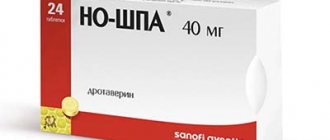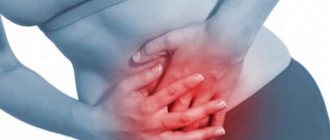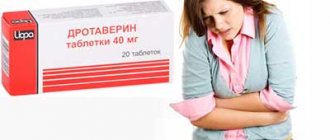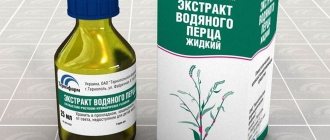For many women, analgin during menstruation is a real salvation, because very often menstrual bleeding is accompanied by pain, and unbearable pain. Especially if menstruation did not come on time, but there was a delay. Analgin for abdominal pain will help you quickly get rid of discomfort, eliminate nagging pain and cramps .
Pain during menstruation can occur as a consequence of the individual structure of the uterus. For example, women with curved bleeding may experience discomfort during menstrual bleeding due to stagnation of blood in the organ. But in some cases, with pathologies of the pelvic organs, after difficult births and abortions, menstrual pain also begins to bother. Therefore, you should definitely undergo a full examination. Once the cause is eliminated, the pain will no longer bother you.
Causes of painful periods
In medical terminology, painful periods are called algomenorrhea (dysmenorrhea, algomenorrhea).
The pain syndrome has three degrees
There are three degrees of pain syndrome:
- moderate pain that does not affect the woman’s activity, the intensity of pain can be tolerated without taking painkillers;
- with algomenorrhea of moderate severity, the pain is nagging in nature, accompanied by other symptoms: nausea, frequent urination, chills, women develop depression and other psycho-emotional abnormalities (irritability, increased sensitivity to bright light, strong odors);
- a severe stage of the disease deprives a woman of the possibility of a normal existence, the pain is so strong that it radiates to the lower back, vomiting, attacks of tachycardia, heart pain, and diarrhea appear.
Doctors believe that the main cause of unbearable menstrual pain is a violation of hormonal metabolism. Increased levels of prostaglandins increase the frequency of contraction of the pelvic muscles.
Other causes of painful periods in adult women include:
- adhesions in the pelvic organs, which is the result of infectious and inflammatory processes;
- frequent abortions, uterine surgeries that leave postoperative scars;
- intrauterine devices of contraception;
- phlebeurysm;
- endometriosis.
Women who suffer from pain during menstruation often feel discomfort during sexual intercourse. Such symptoms cannot be ignored: you must contact a gynecologist to identify and treat the problem.
The most dangerous cause of algomenorrhea are benign and malignant tumors on the appendages or in the uterus.
Continuous pain during menstruation is a reason to consult a women's doctor.
In medicine, algomenorrhea is divided into three degrees:
- Tolerant or moderate. Pain in which a woman experiences a feeling of discomfort and a slight dull ache; she is fully able to endure such pain without drug intervention and at the same time maintains a normal lifestyle.
- The average degree of pain is characterized as nagging, and may be accompanied by dizziness, nausea and chills. The disease is often accompanied by depressive mood and other psycho-emotional disorders.
- Severe or unbearable pain completely deprives a woman of a normal existence. Menstruation may be accompanied by vomiting, tachycardia and other heart pain. The main cause of algomenorrhea, called by medical scientists, is a hormonal imbalance in a woman’s body. An excess of prostaglandins in the body causes an increase in the number of contractions of the flat muscles in the lower pelvis.
Painful sensations usually begin a couple of days before the menstrual cycle and last for several days. Does analgin help with menstruation and is it as safe as many say - many women are concerned about this question. Causes of discomfort during menstruation:
- Abortion or other invasive procedures that leave scars on the uterus.
- Contraceptives that are used intrauterine.
- Varicose diseases.
- Endometriosis.
- Infectious and inflammatory processes leading to adhesions in the pelvic organs.
Menstrual pain in teenagers
At the beginning of puberty after menarche, menstruation takes a long time to recover, often accompanied by pain of varying intensity.
- Painful sensations are associated with increased contraction of the muscles of the uterus, so to make you feel better, you should take antispasmodics.
- Before menstruation, due to multiple changes, blood pressure may decrease, which is why bleeding does not begin or is extremely scanty. In this case, experts recommend taking Citramon, which will dilate blood vessels and relieve spasms.
- Critical days in girls can be accompanied by severe pain due to the incorrect anatomical structure of the uterus, in particular - displacement, bending. The enlarged organ puts pressure on the nerve endings in the intestines, causing severe pain. In this case, the girl will be helped by single-component or combined painkillers. During childbirth, the uterus acquires the desired position, so in most cases painful menstruation stops.
Teenagers are allowed to take the same medications as adults, but it is advisable to understand the cause of the pain and select a medication with the correct mechanism of action. As for Analgin, the opinions of experts differ - some advise, others do not. In emergency cases, you can give the girl any painkiller, but you should not put her on pills, and you should not exceed the dosage. You are allowed to take no more than 2 painkillers and 4 antispasmodics per day.
Primary dysmenorrhea occurs in girls whose menstrual cycle is still unstable. The main cause of menstrual pain in teenagers is the same hormonal imbalance. Most often, the disease begins with the first menstruation and lasts for three years.
There are two types of teenage algomenorrhea
Adolescent algomenorrhea is divided into two types:
- parasympathetic form: an increase in serotonin in the cerebrospinal fluid during menstruation leads to a drop in body temperature, a slower pulse, a temporary increase in extra pounds and swelling of the arms, legs and face;
- adrenergic form: in this case, the levels of adrenaline, dopamine and norepinephrine go off scale, metabolism is disrupted, which is fraught with constipation, fever, insomnia; Girls' faces turn pale and spasms of small blood vessels develop in the extremities, causing them to turn blue.
In most cases, fragile, thin girls who are emotionally excitable are prone to serious irregularities during the menstrual cycle.
But primary dysmenorrhea can be a sign of serious pathologies:
- bends of the uterus, bicornuate uterus, underdevelopment of this organ or anatomical abnormalities;
- connective tissue dysplasia (more than half of adolescents suffer from severe menstrual pain precisely because of a congenital abnormality in the development of connective tissue);
- mental disorders and diseases of the nervous system (pain is significantly aggravated in adolescents with neuroses, psychoses as a result of neurological changes in the perception of pain.
If painful menstruation is not accompanied by serious illnesses, then, according to doctors, the pain will go away on its own after the birth of the child. Natural childbirth causes the uterus to contract less intensely, so the pain is dulled.
If the pain is so severe that it interferes with your studies, and painkillers do not respond to it, it is advisable to consult the gynecology department.
Find out what to do if you have painful periods from the video below.
The first thing you can do is try to relieve severe pain without resorting to medications. To alleviate the condition, the following techniques are used:
- fetal position - lying down with your legs pressed to your body slightly relaxes the abdominal muscles;
- applying heat - during spastic pain, you can put a bottle of hot water or a heating pad on the lower abdomen, sometimes a stream of warm shower directed at the abdomen helps; heat acts as a natural antispasmodic, the main thing is not to overdo it: exposure to too high temperatures increases bleeding;
- “freezing” pain - some women experience relief after applying an ice bag or a cold heating pad; the cold constricts the blood vessels, resulting in dulling of the pain;
- aromatherapy - the smells of essential oils of bergamot, oregano, lavender or jasmine give a slight calming effect that will help you relax and relieve pain;
- massage - stroking the lower abdomen with light circular movements in a clockwise direction can normalize blood circulation in the lower abdomen, which helps eliminate spasms.
One of the most unusual methods for menstrual pain is having sex. Orgasm eliminates congestion in the blood vessels, thereby relieving spasms in the uterus.
Since the uterus is vulnerable to pathogenic microorganisms during menstruation, sexual contact is allowed only with a condom.
Spasms of the smooth muscles of the uterus are quickly relieved by antispasmodics. They are produced in the form of tablets, suppositories, and solution for intramuscular injection. Intramuscular injections work the fastest.
No-shpa is often used for menstrual pain
Among the most well-known medications are:
- No-shpa. The active component of the drug neutralizes the production of prostaglandins, relaxes the uterus, increasing bleeding. The pain goes away, but your periods are much more intense, which leads to the need to change pads more often. The daily dosage of No-shpa is 6 tablets;
- Buskopan. Designed to relieve spasms of smooth muscles of the genitourinary organs; you are allowed to drink no more than 5 tablets per day;
- Papaverine. More often used in the form of suppositories, it has an analgesic effect;
- Spazgan (Spazmalgon). It is used for all types of pain, including menstrual pain, and eliminates spasms in the uterus. Dosage: no more than 6 tablets per day;
- Galidor. In addition to the antispasmodic effect, it has mild sedative properties. Taken three times a day.
If pain occurs due to hormonal imbalance, women are advised to use contraceptives to normalize the balance of hormones: Yarina, Rigevidon, Ovidon, Diane-35, Lindinet.
Hormonal drugs are prescribed only by a doctor, taking into account the individual characteristics of a particular patient.
About 20 years ago, Analgin during menstruation was the right solution for severe abdominal pain. Analgin and its modern derivatives (Baralgin, Novalgin, Piretin, Minalgin) are indeed very powerful painkillers.
Analgin helps relieve pain
They dampen pain of any nature by acting on nerve endings. Even with a huge arsenal of remedies against menstrual pain, women prefer using analgin to them.
But at the moment Analgin is banned in many countries. The active component of the drug (metamizole sodium) provokes bleeding with prolonged use.
Another harmful side effect of Analgin is a decrease in the production of leukocytes, cells that protect the body from infections.
Analgin is prohibited for use by children under 14 years of age with pathologies of the hematopoietic organs; the duration of use is no more than 7 days.
Due to the high probability of ulcer bleeding, I drink it only after meals, with plenty of liquid.
The use of Analgin during painful periods is advisable if other drugs do not bring the expected effect.
It is advisable to establish the cause of algomenorrhea before using such a strong painkiller as Analgin.
In search of the best remedy for relieving menstrual pain, women exchange experiences on women's Internet resources. Among strong painkillers, Ketanov and its analogues (Ketanal, Ketorol) are in demand.
You can’t get too carried away with the drug Ketanov
However, doctors do not recommend getting carried away with such drugs: it is intended to relieve serious bone pain. Ketanov is suitable for an emergency.
One of the popular remedies is Nimesil. This is a non-steroidal anti-inflammatory drug that inhibits the synthesis of prostaglandins. The action of Nimesil lasts 6 hours. But the medicine is prohibited for girls under 12 years of age.
For menstrual pain, women often use antipyretics with paracetamol: Nise or Nurofen. The painkiller Solpadeine is often used.
Regular yoga practice has a good effect. Special exercises (asanas) relieve muscle tension and reduce menstrual pain. Regular yoga classes can normalize hormonal balance.
Despite active advertising, the Frauplast patch has a weak effect: it really warms, but the pain does not go away.
Despite the WHO ban, negative reviews from doctors, the abundance of modern pharmaceuticals on the shelves of pharmacies, our women, during severe pain during menstruation, still prefer to save themselves with a combination of Analgin and No-shpa. More than half of the fairer sex use these medications.
Periodic use of Analgin will not cause harm, but it is initially advisable to establish the cause of dysmenorrhea. Especially in women who have given birth, since severe pain during menstruation may indicate serious inflammatory processes in the pelvic organs.
Noticed a mistake? Select it and press Ctrl Enter to let us know.
Folk remedies with analgesic effect
You can reduce pain during menstruation with special herbal remedies, as well as some other methods.
- Nettle . To prepare the medicine you will need 2 teaspoons of the potion, 200 ml of boiled water. Pour in for 15 minutes. Take three times a day before meals, so that by the end of the day you drink the entire glass. Nettle thins the blood, relaxes the muscles of the uterus, and reduces vascular tone. Thanks to this, an analgesic effect occurs. In addition, the composition contains chlorophyll, which is a natural antibiotic - it prevents the development of pathogenic microflora and accelerates the healing of the mucous membrane. The decoction improves immunity, equalizes hemoglobin, normalizes blood pressure, replenishes vitamin K and iron deficiency, and stops bleeding.
- Hog queen. The plant is taken for various menstrual irregularities and gynecological diseases. The composition contains phytohormones that increase the amount of natural estrogen. It has a complex effect on the body - strengthens the immune system, increases blood circulation in the pelvic organs, accelerates the process of endometrial rejection, relieves spasms, and relieves pain. You should take a decoction of boron uterus or an alcohol tincture 10 days before the start of menstruation. Drinking the product during menstruation is prohibited, as bleeding is possible. At this time, you should switch to another drug - Red Brush. This plant also contains phytohormones, but in this case they increase the amount of progesterone. The combined use of these two plants normalizes the monthly cycle, relieves pain, and normalizes hormonal levels.
- Chamomile. The plant will not save you from severe pain, but it can prevent its occurrence. Chamomile has many beneficial qualities - it relieves pain, heals, disinfects, stops inflammation, protects, and normalizes the functioning of the nervous system. You should start drinking the decoction or tea at the first signs of menstruation. Tea before bed is especially useful, as it provides complete rest, reduces the amount of discharge, and eliminates spasms.
You can get rid of painful sensations by taking a comfortable position - on your side, bending your knees under you, or lying on your stomach. Relief occurs within 15-20 minutes. It is recommended to massage the abdomen in a circular motion in a clockwise direction. In case of severe spasm, place a warm heating pad or a plastic bottle filled with hot water on the stomach. The same method prevents bleeding, but cold water is used.
Modern panacea
Analgin for menstrual pain has become almost a panacea for many, so drinking analgin during menstruation is possible and even necessary. The drug itself belongs to the group of painkillers and non-narcotic medications. It has antispasmodic, antipyretic and analgesic effects. Based on analgin, many other drugs with similar effects have been developed. Another name for analgin is metamizole sodium.
Analgin or metamizole sodium is very often included in complex remedies to combat ailments and side effects. Its action is aimed at enhancing the analgesic effect. The most common complex drugs that can help relieve the disease are Akabel, Remidon, Anapirin.
Each drug has its own characteristics, such as:
- Akabel is used for cramping pain during menstruation; it has a strong antispasmodic property.
- Remidon has antipyretic properties and is used for dull or aching pain. It also has a beneficial effect on the nervous system - improves mood and performance.
- Anaprin has the unique properties of both drugs - it relieves the disease and brings body temperature to normal.
Analogs
The product has many analogues - almost all drugs whose names end in -lgin.
- Pentalgin;
- Baralgin;
- Tempalgin;
- Novalgin;
- Ronaldin;
- Analdim;
- Tonalgin;
- Kofalgin.
And also Baralgetas, Andipal-Neo, Analdin, Tempal. There is a group of combined drugs that contain the active ingredient Analgin.
There are many products with a similar mechanism of action. During menstruation they take Nise, Nurofen, Ibuprofen, Piroxicam, Ketanov, Diclofenac.
Mechanism of action
The medicine is a fast-acting drug, as it has high biopermeability and easily penetrates tissue. The effect of analgin appears within 20 minutes after its administration. Elimination of the pain effect occurs due to the fact that analgin reduces the conductivity of the pain impulse along the nerve fibers.
The drug affects the receptors of the muscles of the genital organs, and when it enters the source of pain, it reduces the amount of prostaglandins produced. It stabilizes the cell membrane of flat muscles, thereby relieving illness and body temperature.
The drug has high bioavailability, penetrates well into tissues and quickly has a therapeutic effect. The medicine is a rapid response substance. The therapeutic effect begins within 20 minutes after taking the drug.
First of all, the action of Analgin is to slow down the transmission of pain impulses along nerve fibers. This is due to the elimination of pain.
Getting into the source of pain, metamizole sodium inhibits the production of prostaglandins, which are responsible for increasing body temperature during inflammation. The drug is sensitive to receptors of the smooth muscles of the genital organs. It stabilizes the cell membrane of smooth muscles, providing antipyretic and antispasmodic effects.
By strengthening the cell membrane, the drug thereby retains sodium and water in the body. It can cause swelling in the provoked organism.
If the pain persists to one degree or another throughout the month, then you need to consult a doctor to clarify the diagnosis and adjust the treatment.
Analgin disrupts the production of leukocytes in the red bone marrow, thereby reducing their content in the blood. A low white blood cell count does not allow the body to sufficiently fight infectious environmental factors. The drug interferes with blood clotting. Long-term use leads to bleeding.
For women with impaired renal and liver function, Analgin aggravates the course of the underlying disease and can cause renal and liver failure.
Contraindications to taking the drug are:
- blood diseases;
- hereditary hemolytic anemia;
- hemophilia;
- kidney disease in the stage of decompensation;
- drinking alcohol;
- bronchial asthma;
- history of drug allergy.
It is unacceptable to take the drug for acute pain until the cause is determined. Analgin will erase the picture of the disease and can lead to a serious condition.
Side effects are observed with prolonged and unsystematic use of the drug. The most common symptoms are:
- nausea;
- vomit;
- allergic reaction;
- bleeding;
- renal failure;
- decrease in blood pressure.
Women suffering from seasonal hay fever should use the drug with caution. A hypersensitivity reaction is possible.
Analgin displaces drugs that lower sugar levels from the blood. Therefore, when used together, strict glycemic control is required.
Analgin has a pronounced analgesic, antipyretic, and mild antispasmodic effect. Once in the stomach, it is quickly absorbed. The maximum concentration in the blood is observed after 20 minutes. Relief occurs after just 5 minutes of use. The effect lasts up to 8 hours.
The mechanism of action is based on relieving pain as quickly as possible. The active component reduces the production of prostaglandins, thereby eliminating pain and stopping the inflammatory process. Analgin also has antipyretic properties and enhances the effect of drugs with similar properties when used together.
Indications and contraindications
It is worth understanding that analgin in this case is not a remedy for the cause of pain, it only eliminates it and possible side effects. The drug cannot be used regularly, as it has contraindications and does not affect the cause of the disease. Metamizole sodium significantly reduces the production of leukocytes in the body, which reduces its ability to fight various infectious diseases, and also affects blood clotting; long-term use can lead to bleeding.
Contraindications, side effects
It is worth understanding that analgin in this case is not a remedy for the cause of pain, it only eliminates it and possible side effects. The drug cannot be used regularly, as it has contraindications and does not affect the cause of the disease. Metamizole sodium significantly reduces the production of leukocytes in the body, which reduces its ability to fight various infectious diseases, and also affects blood clotting; long-term use can lead to bleeding.
Main contraindications:
- Various blood diseases.
- Diseases of the kidneys and adrenal glands.
- Under no circumstances should you take analgin with alcohol.
- Bronchial asthma.
- Allergy to the drug.
Also, the drug should not be used for acute pain, the reason for this is that it can completely “blur” the picture, in which case the gynecologist will not be able to determine the exact cause of the discomfort, which can lead to improper treatment and serious consequences for the woman. Side effects can occur with very long or unsystematic use of the medicine. The most common:
- Nausea and headache.
- Vomit.
- Heavy bleeding.
- Kidney failure.
- Significant reduction in blood pressure.
You should stop using analgin for menstrual pain along with alcohol. Thus, the drug significantly increases the effect of alcohol on the liver and can lead to serious consequences.
Also, special attention should be paid to the use of the medicine together with sedatives, as it can enhance their side effects. In any case, you should consult your doctor before use.
source
According to statistics, 80% of women feel discomfort in the lower abdomen during menstruation and pain of varying intensity. To relieve pain, many women take Analgin during menstruation.
Most women use Analgin every menstrual cycle. The medicine helps with the following conditions:
- aching pain in the lower abdomen;
- spasms;
- throbbing pain.
The drug can only be used periodically. It symptomatically eliminates pain without having any effect on the cause of the pain. Regular use is not recommended due to the presence of contraindications and side effects.
For pain in the lower abdomen, the drug is used for no more than 3 days. If the pain syndrome does not stop after taking the medicine, then you need to consult a doctor to find out the cause of the pain.
If you want to get a quick effect, you can take the drug intramuscularly. However, at the site of drug administration, a local allergic reaction, local pain, and infiltration are possible.
Analgin is a relatively safe drug. In the absence of contraindications for use and the correct daily dosage, it does not cause side effects.
Pain during menstruation varies in intensity. If in some cases antispasmodics - No-Shpa, Drotaverine, Spazmolgon or non-steroidal anti-inflammatory drugs - Citramon, Paracetamol, Ibuprofen work well, in others a strong painkiller is required.
Indications for the use of analgin during menstruation are:
- pain in the lower abdomen, which cannot be tolerated, is not eliminated by antispasmodics;
- a quick analgesic effect is required;
- there is a severe headache.
It is allowed to use the tablets during menstruation if the discharge is insignificant and normal. Usually, painful sensations are present on the eve of menstruation, the first 2 days. If the pain syndrome persists longer, the discharge is strong, it is prohibited to take the drug, since analgin has the property of thinning the blood and provokes bleeding.
It is prohibited to take Analgin for a long course. During menstruation, treatment is allowed for 3 days. The maximum daily dose should not exceed 4 tablets. In general, the analgesic effect during menstruation, if there are no pathological processes, lasts for 8 hours. If there is no therapeutic effect within 20 minutes, with a short-term effect, you should not increase the dose; you need to take a combined medication and seek help from specialists.
Analgin has the property of thinning the blood, so do not exceed the dose and take it during bleeding or heavy menstruation. The active substances reduce the level of white blood cells, which reduces the body's ability to fight infection. With prolonged use, it promotes the accumulation of sodium, retains fluid in the cells, which leads to swelling.
A direct contraindication is individual intolerance to the components. It manifests itself as an allergic reaction on the skin, deterioration in general health, nausea, and vomiting.
- problems with blood clotting;
- renal, liver failure;
- bronchial asthma.
In general, Analgin has a minimum of contraindications; it causes side effects in rare cases, only when the dosage is exceeded or for long-term use. This makes the drug convenient to use during menstrual periods by women of all ages.
Dear readers, your opinion is very important to us - therefore, we will be glad to receive feedback on the use of the drug Analgin during menstruation in the comments, they will be useful to other users!
source
Not all women know whether analgin helps with painful periods. Yes, the drug is effective for this type of pain. It quickly improves your general condition. Drinking Analgin during menstruation should be done with caution, as increased bleeding may occur.
It is usually recommended to first use the minimum dose of medication during menstruation - ½ -1 tablet. If a weak therapeutic effect is observed, the dose may be doubled after a couple of hours. It is recommended to use the medicine three times a day. It is worth noting that the maximum daily dose of drugs for menstrual pain is 8 tablets.
Typically, the duration of symptomatic therapy is 3 days. Is it possible to drink analgin during the first days of menstruation? You should check with your doctor.
You should not take medicine for abdominal pain if:
- Presence of blood diseases
- Hemolytic anemia (hereditary form)
- Serious disorders of the renal system
- Manifestations of bronchial asthma
- Symptoms of hemophilia
- Drinking alcohol
- Previous allergic reactions to the drug.
It is not recommended to take the medicine if acute pain syndrome of unknown etiology occurs. Analgin may mask the manifestations of another disease, which will complicate further treatment.
The development of side symptoms is possible with prolonged therapy. The most common manifestations are:
- Attacks of nausea and vomiting
- The occurrence of allergies
- Opening of bleeding
- Development of serious disturbances in the functioning of the renal system.
If side effects occur, you should stop taking the medication and consult a doctor. Perhaps the specialist will recommend a comprehensive examination to identify the cause of the pathological condition, and based on the results obtained, effective treatment will be prescribed.
Analgin: what helps. Compound. Indications for use
Analgin is one of the most effective painkillers.
The drug belongs to non-narcotic analgesics, medications that reduce the severity of pain, but do not have an effect on the psyche.
What is the drug analgin, what does this remedy help with? Familiarize yourself with the basic information on the drug, find out when it can be used without much harm to the body.
Description
Analgin has an analgesic effect. There are other pharmacological effects - anti-inflammatory, antipyretic. However, Analgin is rarely used to relieve inflammation; in such cases, more effective medications are used.
How long does it take for the drug to help? The effect of the drug appears 30 minutes after its use.
Analgin is intended to relieve pain and fever. It is important to understand that very severe pain can be treated with more effective drugs - narcotic medications.
But still, the most correct decision would be to see a doctor and get examined, and not regularly take analgin. It is important to identify and eliminate the cause of pain.
Does analgin help in treating diseases? Of course, this remedy does not treat hypertension, purulent otitis media, tonsillitis, and does not eliminate many other conditions. The drug helps to get rid of only the unpleasant symptom, but not the cause of the disease.
The medicine is used in cases where quick action is required. The components are easily dissolved and absorbed, which explains the immediate effect that develops as a result of using the drug.
A high concentration of the active substance is achieved in the body in a short time. Since the drug has good solubility, parenteral administration is allowed.
Analgin and all drugs in which it is present are very popular.
Release form
The most commonly used medicine is in tablet form. The standard dosage of the active substance metamizole sodium in one tablet is 500 mg. Also on sale is a drug containing 50, 100, 150 mg of the active ingredient. The composition additionally contains calcium stearate and potato starch. Auxiliary ingredients include powdered sugar and talc.
Since Analgin is highly soluble in water, it is used in the form of injection solutions (25, 50%). The product is available in ampoules of 1 and 2 ml.
The drug is also available in powder form.
What does analgin really help with?
The drug is mainly prescribed for headaches and other types of pain.
- The medication is effective for pain of various origins and any severity, including analgin that helps with toothache.
- The drug is used for myalgia and neuralgia.
- The drug is used to eliminate postoperative pain and acute pain after injuries. It is used in cases of biliary and hepatic colic.
- Prescribed for the treatment of infectious and inflammatory diseases. In this case, it is used to eliminate pain and reduce body temperature. The drug can be used for influenza, febrile conditions, when there is a sharp increase in temperature. The use of the drug is recommended in the absence of a pronounced antipyretic effect after taking other medications.
- Analgin is prescribed for rheumatism and radiculitis. The drug helps to get rid of pain due to inflammatory processes in the muscles and spasms of the muscles of internal organs.
- The product is effective for pain that accompanies tumor processes.
- In cases where it is not possible to implement other measures, analgin is also prescribed for other intense pain, which manifests itself both acutely and chronically.
How to use
It is not enough to know what analgin in tablets and other forms helps with; it is important to know how to use it. The drug is used intravenously, intramuscularly and for internal use. The optimal dosage is determined taking into account the intensity of pain, fever and the body's reaction to the ingredients included in the medicine.
Analgin-Quinine
Analgin-Quinine tablets are taken after eating without disturbing their integrity. Take with sufficient amount of liquid.
The recommended single dose for an adult is 0.25-0.5 g of the drug, the frequency of use is 2-3 times a day. For rheumatism, it is allowed to increase the dose of the drug to 1 g with a frequency of use of 3 times a day.
Children are administered intravenously 5-10 mg of the drug per kilogram of body weight. It is allowed to use the medicine up to 3-4 times a day.
https://www.youtube.com/watch?v=pi0Kz8VPZCg
Three collections that hypertension is afraid of! Pharmacy around us
Injections
If the pain is severe, for adults the drug is injected into the muscles or veins. Injections are given 2-3 times a day using 1-2 ml of solution. The maximum daily dose is 2 g. If a 25% solution is administered to a child, 0.2 to 0.4 ml of the product is taken per 10 kilograms of body weight. When the solution concentration is 50%, its amount is reduced to 0.1-0.2 ml.
Subcutaneous administration is not carried out due to the risk of tissue irritation. The maximum single dose of the drug for internal use by an adult is 1 g, the daily dose is 3 g. For administration into the vein and muscles, a single dosage of 1 g and a daily dose of 2 g are provided.
Tablets for children and the elderly
Children under 14 years of age are prescribed 8-16 mg/kg; if it is necessary to reduce body temperature, 10 mg/kg. For patients over 15 years of age and weighing more than 53 kg, a single dosage of no more than 1 g is prescribed. If the desired effect does not develop, the frequency of taking the drug at the maximum single dose is increased to 4 times a day.
Elderly patients require smaller amounts of the drug, since the elimination of metabolites may occur at a slower rate.
In cases where the kidneys do not fully perform their functions, creatinine clearance is impaired, and it is also not recommended to use high doses of the drug.
The same recommendations apply to patients with reduced hepatic and renal function. If you plan to use the medication for a short term, it is not necessary to reduce the dose.
Do not use the product for a long time. For other patients during long-term therapy, regular blood tests, including white blood cell count, are recommended.
For a child aged 10-14 years with a weight of 32-53 kg, one tablet containing 500 mg of the active substance is prescribed at one time. Do not take more than four tablets per day.
Adults
Patients over 15 years of age with a body weight of at least 53 kg take 1-2 tablets at a time, that is, from 500 to 1000 mg, but not more than eight tablets per day, which corresponds to 4000 mg of the active ingredient.
Contraindications
It is important to know not only what analgin helps with, but also in what cases it is prohibited to use it. The drug is not given to children under 10 years of age, and is not prescribed for the following conditions:
- disorders in the bone marrow and hematopoietic system;
- excessive sensitivity of the body to the components;
- acute intermittent porphyria, accompanied by systolic blood pressure less than 100 mm Hg. Art.;
- pregnancy;
- aspirin asthma;
- intolerance to the components of analgesics and non-steroidal medications that have an anti-inflammatory effect;
- hemolytic anemia of a hereditary nature, which arose against the background of glucose-6-phosphate dehydrogenase deficiency.
Side effects
After prolonged use of Analgin, the likelihood of suppression of hematopoiesis increases. Due to this risk, it is important to regularly check your blood composition.
There are known cases of allergic reactions. When administered intravenously, some patients experience anaphylactic shock.
How does blood pressure change when taking the drug?
Does analgin help in cases where blood pressure is impaired? The drug has an effect on the blood, so many people think that it will help with blood pressure if it increases. In fact, the components of the drug reduce blood pressure, so it is better for hypotensive patients to choose another medication or use Analgin very rarely and in the most minimal quantities.
As for hypertensive patients, the drug is not used as a blood pressure lowering agent.
Under the influence of the components of the drug, blood pressure changes insignificantly; a noticeable result is observed only with regular use of analgin.
But since regular use of the medication is prohibited, and it is not one of the most effective means designed to solve such a problem, this treatment option is not provided.
For a hangover – is there any effect?
Does the product help cope with the consequences of drinking alcoholic beverages? Analgin helps with a hangover, it eliminates some of the unpleasant symptoms.
But it is worth noting that when the drug is combined with alcohol, its negative effect on the kidneys, liver and other organs increases. If there are problems with the kidneys, it is better to choose another drug.
To protect your body from intoxication after drinking alcohol, you need to eat protein foods and drink enough liquid in small portions.
Breakfast that lowers blood sugar in 6 days
During menstruation
Will analgin help with menstruation and should it be used if pain occurs? During menstruation, you can improve your well-being in many ways. Painkillers are used only in cases where a person becomes temporarily unable to work due to severe pain.
Analgin will effectively help with menstruation from the stomach. This is a powerful pain reliever, so it is used in rare cases. The drug helps with abdominal pain, but if used frequently it is harmful to health. During pregnancy, women are prohibited from using this medicine.
For a cold
The medication is an effective remedy for colds. Despite the fact that when using it the cause of the disease itself is not eliminated, the state of health improves. If necessary, the doctor can give an injection of analgin for fever. In addition, the drug helps with sore throat.
Do you use analgin for stomach pain?
If there is discomfort in the abdomen, the question often arises: will analgin help with stomach pain? For inflammatory processes in the gastrointestinal tract, the drug is ineffective, which means it is impossible to get rid of pain through its use. Moreover, the components of the drug can cause some harm to the digestive tract.
For pain in the heart
Does the drug help improve well-being with heart pain? It is known that analgin not only helps with the head, but also eliminates pain in other parts of the body. In cases where discomfort occurs in the heart area, one tablet of analgin is used. The effect of the drug should appear within 15 minutes. Validol, Corvalol or Valocordin are also used.
Analgin+diphenhydramine
Since drugs can interact with each other, you should always read the instructions carefully. For example, when analgin is combined with diphenhydramine, the effect of the drugs is more pronounced. The mixture is recommended to be taken for fever. This medicinal composition will help reduce the temperature in the presence of inflammation or infection.
It is recommended to combine drugs in cases where a tooth hurts badly or a headache occurs that is not eliminated by other medications. Medicines will also help with hepatic colic and relieve pain from burns and injuries.
If the mixture with diphenhydramine does not help, what to do in such cases? Contact your doctor, he will select other medications or change the dosage of previously prescribed medications.
Reviews about the use of Analgin during menstruation
For many women, analgin during menstruation is a real salvation, because very often menstrual bleeding is accompanied by pain, and unbearable pain. Especially if menstruation did not come on time, but there was a delay. Analgin for abdominal pain will help you quickly get rid of discomfort, eliminate nagging pain and cramps.
Pain during menstruation can occur as a consequence of the individual structure of the uterus. For example, women with curved bleeding may experience discomfort during menstrual bleeding due to stagnation of blood in the organ. But in some cases, with pathologies of the pelvic organs, after difficult births and abortions, menstrual pain also begins to bother. Therefore, you should definitely undergo a full examination. Once the cause is eliminated, the pain will no longer bother you.
Analgin is a pain reliever, available in the form of tablets, injection solutions, and rectal suppositories. The active ingredient is sodium methanesulfonate. Under its action, pain syndromes of various etiologies are relieved and the effect of antipyretic drugs is enhanced.
During menstruation, it does not help all women, although the medicine is considered one of the best pain relievers. This happens because a representative of the fairer sex takes pills too often, against the background of which “analgin addiction” develops. But judging by the reviews of women, in most cases the drug is really effective; after just a few minutes it eliminates pain. This is explained by the ability of the main active component to be quickly absorbed into the blood and influence the substances responsible for pain.
The drug itself is not therapeutic. The tablets only eliminate unpleasant symptoms - pain during menstruation - and act as a weak antipyretic. Analgin simply hides the pain. It does not treat a disease if pain is a sign of pathology.
source
Painkillers for teenage girls
At the beginning of puberty after menarche, menstruation takes a long time to recover, often accompanied by pain of varying intensity.
- Painful sensations are associated with increased contraction of the muscles of the uterus, so to make you feel better, you should take antispasmodics.
- Before menstruation, due to multiple changes, blood pressure may decrease, which is why bleeding does not begin or is extremely scanty. In this case, experts recommend taking Citramon, which will dilate blood vessels and relieve spasms.
- Critical days in girls can be accompanied by severe pain due to the incorrect anatomical structure of the uterus, in particular - displacement, bending. The enlarged organ puts pressure on the nerve endings in the intestines, causing severe pain. In this case, the girl will be helped by single-component or combined painkillers. During childbirth, the uterus acquires the desired position, so in most cases painful menstruation stops.
Is it possible to drink analgin during menstruation?
Will analgin help with menstruation? In fact, yes, for abdominal pain during menstrual bleeding, it acts after 20-25 minutes. This is why many women prefer to take this medicine during their periods. In addition, the cost of the drug is affordable; it itself almost never causes side effects if the rules of administration are not violated.
You can use analgin during menstruation, but you cannot endure the pain. But it is better to take the pills together with drugs that eliminate spasms, for example, No-shpa, because pain during menstruation is mainly spasmodic.
Indications for the use of tablets during menstruation:
- throbbing, aching pain in the lower abdomen;
- spasms;
- severe headaches, joint pain.
What is the drug
Analgin is a popular medication.
The drug has been used for at least 20 years. The positive effect of the drug is due to its effect on nerve endings. The drug is a pain reliever. The medication is not a narcotic and is not addictive. The main components of the drug are presented in the table.
| Active ingredients | The main component of the drug is metamizole sodium. It is this component that has anti-inflammatory, antipyretic and analgesic effects. The active substance reduces the synthesis of prostaglandins. Thanks to this, the intensity of the painful sensation is reduced. It is the main component that makes it possible to reduce sensitivity. |
| Additional components | The preparation contains the following as excipients: • talc; • calcium stearate; • starch. |
The drug is available in the form of tablets and solution in ampoules. When using the medicine in liquid form, the positive effect occurs faster. It is usually used when it is necessary to urgently relieve a painful sensation.
Analgin is also sold in injection ampoules
Analgin liquid has a yellowish color. In this form, purified water is present as an addition. This is a kind of solvent.
One of the advantages of the drug is its low cost. You can purchase the medicine at any nearest pharmacy. Store the drug in a dry and cool place, away from direct sunlight and children.
How does analgin affect menstruation?
The action of the drug is based on the relief of pain. Cramps that occur before menstruation and during menstrual bleeding are intense contractions of the uterine muscles. They arise under the influence of hormone-like compounds - prostaglandins. When the muscles contract, the uterus pushes out the mucous membrane it does not need.
Prostaglandins also influence the functioning of the gastrointestinal tract. This is why many women experience attacks of nausea and diarrhea. Sometimes these spasms are accompanied by back pain. Analgin reduces the production of prostaglandins, which relieves pain. The drug does not in any way affect the duration of menstruation, as well as the volume of discharge.
When to abstain
Like any drug, analgin also has a lot of contraindications that cannot be ignored. For pain during menstruation, you can take no more than 2 tablets per day for 3 days. The effect of the drug lasts 8-9 hours. If the dosage and duration of administration are violated, the so-called “analgin addiction” develops. Therefore, it is better to alternate the drug with other painkillers.
If the pain is severe, and it is the middle of menstrual bleeding, it is no longer recommended to drink analgin at all, because it has the property of thinning the blood. This can lead to increased bleeding. Therefore, if you have heavy periods, you should refrain from using this drug.
With long-term use, anemia may develop. Regular use of analgin also causes sodium accumulation, which leads to fluid retention in the intercellular space, and therefore to swelling.
- individual intolerance to the main active ingredient;
- poor blood clotting;
- pathologies of the renal and hepatic systems;
- respiratory diseases.
- unpleasant symptoms do not go away after the end of menstrual bleeding;
- high body temperature lasts more than 2 days;
- there are loose stools more than 5 times a day;
- a rash appeared during menstruation;
- The last 2-3 times my menstrual bleeding was especially heavy.
If a woman takes a pill during her period, and the pain-relieving effect is not observed after 20-25 minutes, under no circumstances should the dose be doubled. It is better to take an antispasmodic tablet.
In addition, when the dosage is increased, the drug can cause side effects in the form of:
- dysfunction of the kidneys and hematopoietic system;
- hives;
- Quincke's edema;
- bronchospastic syndrome;
- anaphylactic shock;
- lowering blood pressure.
If the proper therapeutic effect does not occur, analgin can be replaced:
- But-spy.
- Drotaverine.
- Papaverine.
- Meverin.
- Buscopan.
- Halidor.
- Nurofen.
- Ibuprofen.
- Paracetamol.
- Citramon.
- Diclofenac.
An important point is that analgin should not be taken together with alcohol, and not only during menstruation. Alcoholic drinks are an absolute contraindication, because under the influence of analgin, alcohol lingers in the blood much longer. This means that the breakdown products of ethanol will poison the body for a long time.
Doctors' opinion
Doctors note that analgin is a strong pain reliever. During menstruation, it can be taken if the bleeding is not heavy. You can take the tablets for the first 2-3 days. If the pain does not stop during this time, a consultation with a gynecologist is necessary. Painful periods are a sign of endometriosis, polyps in the uterine cavity, inflammation of the appendages and ovaries, fibroids.
Many gynecologists advise their patients to drink analgin together with No-shpa. This combination perfectly relieves muscle spasms and eliminates menstrual pain. If a woman wants to achieve a faster effect, she can inject analgin intramuscularly. It is worth paying attention that a local allergic reaction is possible at the injection sites.
source
How to determine dosage
The dosage is selected by the doctor individually. The doctor takes into account:
- patient's age;
- the cause of the pain syndrome;
- additional deviations;
- weight.
If the pain does not go away for a long time, then you need to go to the gynecologist.
Usually one tablet is enough to normalize the condition.
Rarely is a larger dose required. The drug can be used for a maximum of 3 days. After this, treatment with Analgin should be stopped. Read also: what pills can relieve menstrual pain.
If the painful sensation does not disappear within three days, you should immediately consult a doctor. There may be serious deviations for which Analgin is not effective.
The drug can be administered intramuscularly. This is necessary when the pain syndrome is severe.










